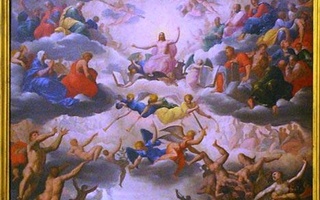They gave up touring when it was no longer fun. "Once you've got to manufacture it, it doesn't work. You've got to give to receive," Ringo said. Or as John put it, "It's like the Army, Whatever'n the Army's like."
They gave up touring at a time when they were being offered a million dollars a concert, when they were near to the height of their popularity. They were already rich, sure, but how many other performers turned their backs on that much money, adulation, and love...turned their backs on it because it wasn't, well, fun anymore? Fun! Don't they realize man has to sweat to earn his bread? Don't they realize that show business is a business, and that you have to get while the getting's good? Don't they know that life isn't all fun and games? that adults sometimes have to do things they don't like? For Chrissake, Brain, they're acting like a bunch of kids!
IV.
PLAYING around was what it was all about, and if it's no fun then it's not playing anymore. The Beatles played with the all powerful media men (for God's sake, John, be decent to these reporters they can make or break you), they played with the Royal Family, and they played with Ed Sullivan. They played with each other.
And they played with different styles. The Beatles version is the one most of us probably remember of Chuck Berry's "Roll Over Beethoven," or Smokey Robinson's "You Really Got a Hold on Me." Or "Please, Mr. Postman." Or "Act Naturally." They were the first to turn us on to a lot of things we later grew to love for their own sake. But their version was always something special. There was a quality of ironic distance or dual consciousness in their version. It was a sense of the Beatles playing wholeheartedly at the being black, at being Chuck Berry, at being Buck Owens, but remaining the Beatles at the same time.
It was this sense, perhaps, that gave us the security to engage and explore and different styles of music and of life, black music for example. They showed us a style of engagement that would preserve our sense of self, that wasn't slavish imitation, that neutralized our fear of put-down, that enabled us to deal with, assimilate to our own needs, and to love, elements that we may have once feared.
The playing with styles by no means stopped when they began performing only their own compositions. On "Sgt. Pepper's Lonely Hearts Club Band" they play at being...well, Seargent Pepper's Band for one thing. The play at being sixty-four. And they play with different states of consciousness: they play at being lonely, at being stoned(and while stoned), and at going insane.
The playing with states of consciousness is of course similar to, and more important than the playing with other people's music. And the effect is the same. You can take what you can from different states of consciousness, learn from them, assimilate them to yourself without being destroyed by bad trips. We'd love to turn you on.
And perhaps you can, if only for a moment, attain to the radically transformed, profound and transcendent state of consciousness of "Within You Without You."
But then, of course, somebody laughs.
And the album even includes four toys to cut out and play with.
V.
THE BEATLE who seems most interesting as presented in Hunter Davies' book is, not surprisingly I suppose, John Lennon. He displays a personality by turns ironic, tender, farcially funny, bitter, nasty, generous, and deeply despairing. His attitude towards the world, towards art, the Beatles, himself, his family, his past is always ambiguous, usually ironic and tinged with a definite sadness.
Lennon is at times completely cut off from the outside world. He is entirely silent, speaking to no one, not even his wife, for as long as three days at a time. Conversely, he can be violently generous with himself and his money, and wildly exuberant in playing with his mates, the other Beatles. In all, John displays the complexity of character, the difficult emotional life that we associate with the artist.
Lennon's childhood seems to have been unhappy in every external circumstance. Fred, his father, deserted his wife shortly before John's birth. His mother soon left John in the care of an aunt, Mimi. Mimi's husband George, who became the child's close friend, died when John was thirteen. At this time John's real mother reappeared, and she and John became extremely close: "She spoke the same language, liked the same things, hated the same sort of people." At about the time John entered Art College his mother was run over by a car and instantly killed. "I thought fuck it, fuck it, fuck it. That's really fucked everything. I've no responsibilities to anyone now."
Read more in News
Editors for this Issue:Recommended Articles
-
The Beatles Appreciation Society: Beatle Mania Hits Harvard (Again)Roll up for the Magical Mystery Tour: a ticket to ride with the Beatles Appreciation Society at Harvard (BASH). Four
-
Beatle Will Not HelpJohn Lennon of the Beatles has turned down an invitation to come to the Harvard Summer School for one week
-
Beatles Abbey RoadALL US rock and roll freaks are also inveterate list-makers, and we spend a large part of our non-listening hours
-
The Rock-Freak A Few RushesYOU KNOW I don't think the full Significance of Let it Bleed has dawned yet on any of us. The
-
Top Ten: In your Ear RecordsTop ten staff recommendations from "In Your Ear Records" an independent record shop on Mount Auburn Street.
-
 Seven Songs for the Apocalypse
Seven Songs for the Apocalypse













